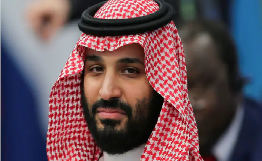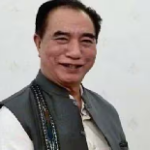Bradley Hope
In 2020, Justin Scheck and I published Blood and Oil: Mohammed bin Salman’s Brutal Quest for Global Power (Hachette). This Next Chapter looks at why the last four years of the crown prince’s rule have been a marked departure from his first five, and what that means for his and Saudi Arabia’s future. The image was striking: US President Joe Biden greeting Mohammed bin Salman with a fist bump at the entrance of Jeddah’s Al Salam Royal Palace. It was July 2022 and just two years earlier, Biden had vowed to make Saudi Arabia a “pariah” over the killing of journalist Jamal Khashoggi. But with oil prices surging, he could no longer afford having MBS as an enemy.
For the Crown Prince, the diplomatic reset couldn’t have come at a better time. The war in Ukraine — which pushed up the price of oil — had given him the leverage he needed to position Saudi Arabia at the center of a rapidly shifting world order, and to present himself as both globally engaged and strategically patient. When Biden asked MBS to ease oil prices, he declined. American diplomats were shocked, but MBS needed oil revenues to keep flowing.
MBS’s rise to power had been marked by extravagant spending, bold cultural reforms and a devastating war in Yemen. The cocksure young prince had shaken Saudi Arabia to its foundations. But the 2022 meeting with Biden showed that MBS, while no less ambitious, was increasingly attuned to his place on the world stage. Reforms that had once generated headlines — women driving, genders mixing in public, entertainment events — have become the new normal. New industries are taking root across the country and a brand new megacity, NEOM, is under construction. MBS has played the role of peacemaker in the Middle East and even forged a closer relationship with Turkey’s Tayyip Erdoğan, whose intelligence services leaked a detailed account of the Khashoggi murder.
This older, evolved MBS may be further emboldened by the looming change in Washington. During Donald Trump’s first term, the crown prince maintained close ties to the White House. With Trump’s return, MBS’s standing in the international arena will surely be solidified. His cultivation of Trump and his inner circle, once seen as a risky bet on an unconventional president, has proven prescient.
To understand how MBS has developed his style of leadership, it’s worth considering both the aftermath of Khashoggi’s murder as well as the social and economic changes MBS is bringing to Saudi Arabia through his 2030 Vision.
MBS took “full responsibility” for the 2018 killing inside the Saudi consulate Istanbul, although he also denied ordering it. The gruesome details that emerged gave him little choice but to pivot inward and focus on creating a new kind of Saudi Arabia. For that, MBS needed money. He took the controversial view that the country’s future depends in large part on monetizing its oil today before demand begins to peter out. The 2019 IPO of Saudi Aramco — considered the crown jewel of the country’s energy industry — was one way to achieve this goal. Although the share sale fell short of an initial $2 trillion valuation target, the process still raised $25.6 billion, making it the largest IPO in history at the time.
MBS has been using some of that money to rebrand Saudi Arabia as a major destination for international travelers. New hotels are opening and being constructed all along the coast in the hopes that millions of tourists can be diverted from Southeast Asia and elsewhere in the Gulf to Saudi Arabia. From Formula 1 races in Jeddah to the MDLBeast Soundstorm music festival attracting hundreds of thousands of attendees, Saudi Arabia is rebranding itself as a major destination. The rebuild also extends to a giant 400-meter cubic structure under construction in Riyadh that will be one of the world’s largest buildings, including 100,000 residential units, 9,000 hotel rooms, 80 entertainment and cultural venues and 1.4 million square feet of office space.
For many Saudis, especially the youth who make up 70% of the population, these changes represent unprecedented opportunities. The burgeoning entertainment and tourism sectors are creating thousands of jobs, and young Saudis are embracing new freedoms in music, art and social interactions. The ancient city of Al-Ula, with its UNESCO World Heritage site Hegra, has become a centerpiece of Saudi Arabia’s tourism push. The Winter at Tantora festival, launched in 2018, brings international artists and visitors to the region, showcasing Saudi Arabia’s pre-Islamic history and natural beauty. In 2022, the kingdom introduced a new visa system, making it easier for tourists from 49 countries to visit.
NEOM, the $500 billion megacity project announced to skepticism in 2017, is taking shape because of the sheer willpower of MBS alone. This was not a project the market asked for, but in his eyes it is a crucial development for the future of the country. Nestled in the northwestern corner of the country, a largely undeveloped region near Jordan, Egypt and Israel, MBS is betting that by conjuring a huge city of the future, Saudi Arabia will ensure its relevance for decades to come.
With steel shipments coming from around the globe, construction on “The Line,” a 170 kilometer-long linear city within the NEOM project, is underway. The design embodies MBS’s approach to development. The project seems impossible, perhaps unfeasible, yet it is happening nonetheless. There have been setbacks, delays and budget cuts. Some targets have been significantly pared back. The CEO of NEOM was also replaced earlier this month. But this incredibly ambitious project keeps moving ahead nonetheless.
The emerging challenge is finding enough cash to complete so many mega projects and make Saudi Arabia’s economy sustainable. The country is on a cost-cutting and efficiency mission that includes paying some big vendors late to preserve cash. No matter how fast Saudi Arabia monetizes its oil, it also needs others to believe in the story and invest, too. That isn’t happening fast enough and remains an existential risk to the MBS project over the next six years. MBS is betting a lot on uncertainty: If he builds it, will anyone come?
Strategic Thinking
At the center of all the biggest initiatives is the country’s sovereign Public Investment Fund, which became one of the world’s most aggressive financial players under MBS’s direction. By 2022, its assets under management had grown to more than $600 billion, with plans to reach $2 trillion by 2030. The PIF’s investments range from Silicon Valley startups to Premier League football clubs. In 2021, it acquired the football team Newcastle United. The 2022 launch of LIV Golf, a PIF-backed challenger to the established PGA Tour, epitomized the PIF’s standard approach: big, bold and unafraid to ruffle feathers in pursuit of Saudi interests.
While critics labeled these investments as “sportswashing” — using sports to improve Saudi’s international image and distract from ongoing human rights concerns — MBS sees them as part of a broader strategy. The 2034 FIFA World Cup bid, jointly submitted with Egypt, and the hosting of the 2030 World Expo aren’t just about image rehabilitation; they are calculated moves to position Saudi Arabia as a global entertainment and sports hub.
Another powerful symbol of Saudi’s financial clout is the annual Future Investment Initiative (FII) forum, dubbed “Davos in the Desert.” Many Western organizations initially boycotted the conference following the Khashoggi killing. But in October 2024, the forum drew its largest crowd ever, with global CEOs, tech leaders and politicians coming in the hopes of persuading PIF and MBS’s advisers to give them access to its once-in-a-generation spending spree. “We are very, very excited and happy with what we have achieved in the Saudi Vision 2030, but we are not complacent,” said Mohammed al Jadaan, Saudi’s finance minister. “We are doubling down, making sure that we are doing the right thing.”
The FII demonstrates that instead of direct confrontation, MBS has learned to wield Saudi Arabia’s economic and cultural clout more strategically. When faced with international criticism, the kingdom increasingly applies pressure through business deals and visa policies rather than public statements.
That clout is impacting geopolitics as well. At a summit in Al-Ula in January 2021, MBS personally brokered an end to a rift between several Gulf States and Qatar over the latter’s foreign policy and its media’s role in fomenting regional differences. The Crown Prince also symbolically embraced Qatar’s emir in a public gesture of reconciliation. This move stabilized the region and allowed Saudi Arabia to present a more united Gulf front on the world stage even as MBS’s long-time partner, Mohammed bin Zayed of the United Arab Emirates, appeared to struggle to embrace the change.
Even more remarkably, MBS has opened backchannel negotiations with Iran, Saudi Arabia’s long-standing nemesis. These talks, mediated by Iraq and Oman, marked a dramatic shift from the confrontational stance of MBS’s early years in power — particularly in Yemen, where a Saudi-led coalition has been fighting Iranian-backed Houthi rebels since 2015.
Saudi First
Most critically, none of these efforts were done in lockstep with the US. Saudi foreign policy is now definitively “Saudi first.” And domestically, MBS has maintained a firm grip on power. Rivals within the royal family remain sidelined or under house arrest, seemingly for life. Activists and critics continue to face harsh punishments, though with less of the brazen impunity that characterized the Khashoggi affair. The release of women’s rights activist Loujain al-Hathloul in February 2021, while celebrated internationally, came with strict conditions including a travel ban.
Human rights organizations continue to criticize Saudi Arabia’s treatment of dissidents and its lack of political freedoms, but the world that sought to isolate MBS now has no choice but to engage. The age of MBS has begun — an era where Saudi Arabia’s influence extends far beyond oil markets. From Silicon Valley boardrooms to Premier League stadiums and gaming, from renewable energy projects to artificial intelligence research, the kingdom’s fingerprints are increasingly visible on the global economy.
As Saudi Arabia prepares to host the World Expo in 2030 and the World Cup in 2034, it is clear that MBS has transformed his nation. His model of authoritarian modernization, combining social reforms with strict political control, has also inspired other leaders in the region and beyond. Whether this new paradigm proves sustainable remains to be seen, but one thing is certain: The implications of Saudi Arabia’s transformation under MBS will reverberate far beyond the kingdom’s borders for decades to come.



